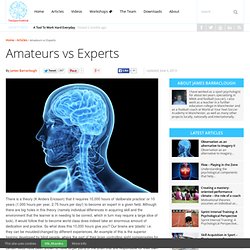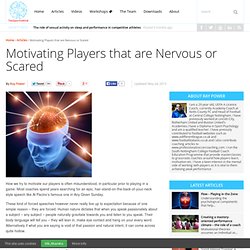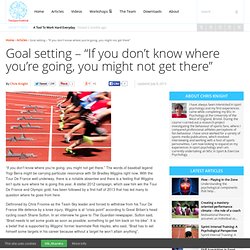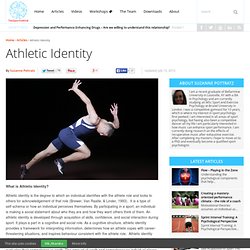

Amateurs vs Experts. There is a theory (K Anders Ericsson) that it requires 10,000 hours of ‘deliberate practice’ or 10 years (1,000 hours per year, 2.75 hours per day!)

To become an expert in a given field. Although there are big holes in this theory (namely individual differences in acquiring skill and the environment that the learner is in needing to be correct, which in turn may require a large slice of luck), it would follow that to become world class does indeed take an enormous amount of dedication and practice. So what does this 10,000 hours give you? Our brains are ‘plastic’ i.e. they can be moulded/changed by different experiences. An example of this is the superior hearing developed by blind people, where the part of their brain controlling sight compensates for lack of this ability by being taken over by the hearing part (put very simply). Another way in which we change as an expert is in cue anticipation – what we look at to predict an opponent’s next move.
Motivating Players that are Nervous or Scared. How we try to motivate our players is often misunderstood, in particular prior to playing in a game.

Most coaches spend years searching for an epic, hair-stand-on-the-back-of-your-neck style speech like Al Pacino’s famous one in Any Given Sunday. These kind of forced speeches however never really live up to expectation because of one simple reason – they are forced. Human nature dictates that when you speak passionately about a subject – any subject – people naturally gravitate towards you and listen to you speak. Their body language will tell you – they will lean in, make eye contact and hang on your every word. Alternatively if what you are saying is void of that passion and natural intent, it can come across quite hollow. What you say to your players and how you say it will vary on what mood the players are in, rather than what mood you are in. ScaredNervousConfidentComplacent Scared This is where your players need you most. The Sport In Mind.
Goal setting – “If you don’t know where you’re going, you might not get there” “If you don’t know where you’re going, you might not get there.”

The words of baseball legend Yogi Berra might be carrying particular resonance with Sir Bradley Wiggins right now. With the Tour De France well underway, there is a notable absentee and there is a feeling that Wiggins isn’t quite sure where he is going this year. A stellar 2012 campaign, which saw him win the Tour De France and Olympic gold, has been followed by a first half of 2013 that has led many to question where he goes from here. Dethroned by Chris Froome as the Team Sky leader and forced to withdraw from his Tour De France title defence by a knee injury, Wiggins is at “crisis point” according to Great Britain’s head cycling coach Shane Sutton. In an interview he gave to The Guardian newspaper, Sutton said, “Brad needs to set some goals as soon as possible, something to get him back on his bike”.
Goal setting is believed to improve performance by boosting self-confidence and help people adhere to exercise routines. Athletic Identity. What is Athletic Identity?

Athletic identity is the degree to which an individual identifies with the athlete role and looks to others for acknowledgement of that role (Brewer, Van Raalte, & Linder, 1993). It is a type of self-schema or how an individual perceives themselves. By participating in a sport, an individual is making a social statement about who they are and how they want others think of them. An athletic identity is developed through acquisition of skills, confidence, and social interaction during sport. It plays a part in a cognitive and social role. Benefits Potential Risks Brewer et al., (1993) suggested that strong athletic identity may force an athlete to neglect other aspects of life in order to fill the athlete role. Emotional Difficulties Dealing with Injury: Injuries are an inevitable part of sport. Athletic identity is an important dimension of self-concept in most individuals, not only athletes.